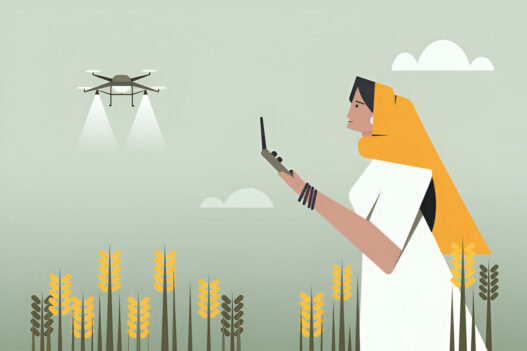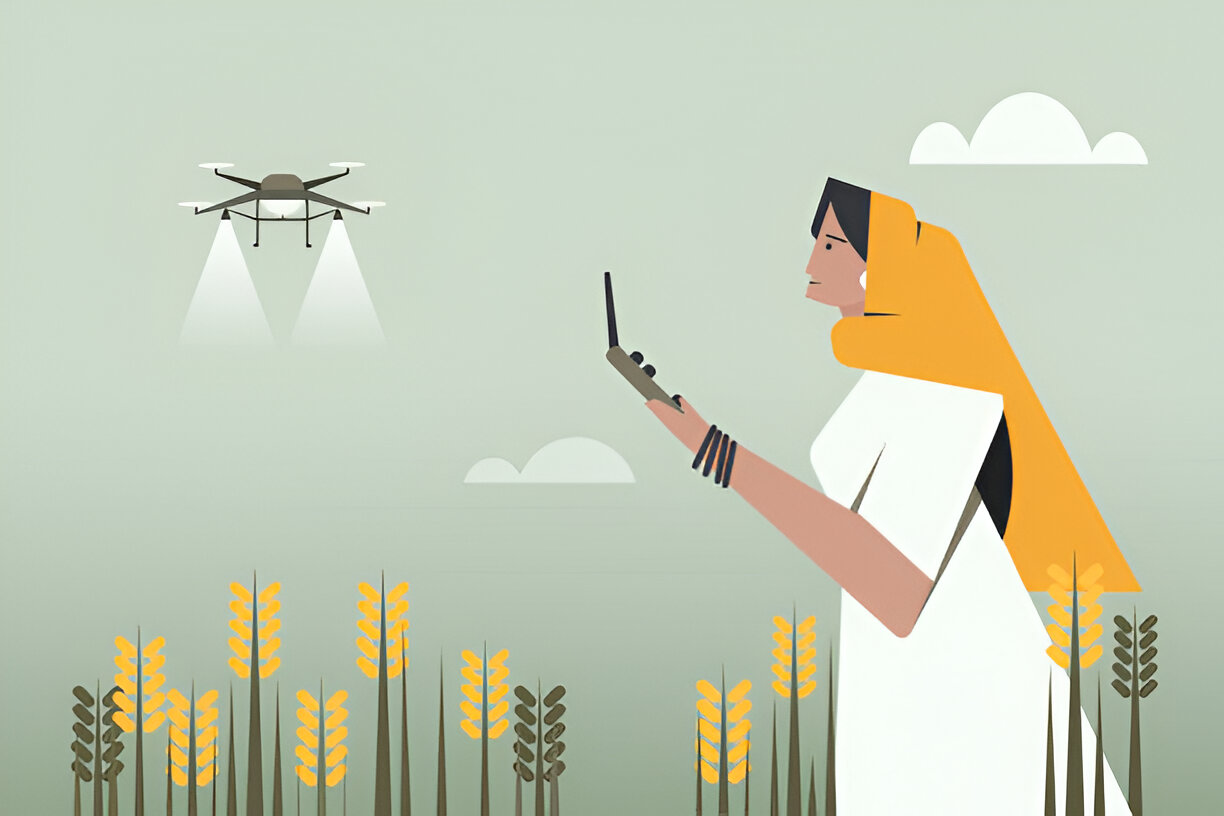The Indian government has launched an ambitious initiative, the Namo Drone Didi Scheme, designed to empower women-led Self-Help Groups (SHGs) by integrating drone technology into agriculture. This transformative scheme aims to provide drones to 14,500 selected Women SHGs between 2024-25 and 2025-26. The drones will be used to offer rental services to farmers, primarily for applying liquid fertilizers and pesticides. This initiative is projected to generate an additional income of at least ₹1 lakh per year for each SHG, thus fostering economic empowerment and sustainable livelihoods.
Key Features of the Scheme
The Namo Drone Didi Scheme has several key features designed to make drone technology accessible to women SHGs. A significant aspect is the subsidy provided, covering 80% of the drone cost, up to a maximum of ₹8 lakhs. The remaining amount can be availed as a loan from the Agriculture Infra Financing Facility (AIF) at a concessional interest rate of 3%. The drone package includes drone pilot training to ensure that the women are equipped to operate the drones proficiently. This comprehensive approach ensures that women are not just provided with equipment, but also with the skills to utilize them effectively.
Transforming Agriculture through Drone Technology
Drone technology is revolutionizing agricultural practices in India. The scheme facilitates the precise application of pesticides and fertilizers, thus reducing waste and minimizing environmental impact. Drones equipped with advanced GPS and sensor technology can be programmed to follow specific flight paths over fields, ensuring even and targeted application. This capability not only reduces the overuse of chemicals but also lowers costs for farmers, contributing to more sustainable and efficient agricultural practices.
Skill Development and Capacity Building
The Namo Drone Didi Scheme prioritizes skill development by providing specialised training in drone technology to women. This training enables them to acquire advanced skills in modern agricultural practices. Women are trained to use drones for precise application of fertilizers, pesticides, and herbicides, ensuring even distribution and optimal usage. They also learn to conduct soil and field analysis, which helps streamline surveys and assess fertility. The training further covers effective irrigation management, including identifying areas needing more or less water, detecting leaks, and managing water resources. This approach transforms women into adept agricultural technology experts.
Fostering Community and Networking
The scheme promotes a strong sense of community among women participants. Through a supportive network, women share experiences, discuss challenges, and learn best practices in the field. The scheme facilitates workshops and forums, which further enhance collective knowledge and skills. Access to industry experts, mentors, and agricultural professionals provides mentorship and facilitates professional growth. This approach promotes holistic development.
Operational Guidelines for Effective Implementation
The Department of Agriculture & Farmers’ Welfare has released detailed operational guidelines to ensure smooth implementation of the Namo Drone Didi Scheme. An Empowered Committee at the Central level oversees the scheme. The committee includes secretaries from multiple departments, such as Agriculture & Farmers’ Welfare, Rural Development, Fertilizers, Civil Aviation, and Women and Child Development. An Implementation and Monitoring Committee, led by the Additional Secretary of the Department of Rural Development, ensures effective planning and implementation.
The scheme provides central financial assistance, covering 80% of the cost of drones and accessories, up to ₹8 lakhs. The remaining cost can be covered by loans from the National Agriculture Infra Financing Facility (AIF) with a 3% interest subvention. Cluster Level Federations (CLFs) or SHGs can also access loans from other sources.
The comprehensive drone package includes basic drone with spray assembly, carrying box, battery set, camera, charger, anemometer, and pH meter. It also includes spare batteries, propellers, a nozzle set, fast battery charger, and 15 days of training for drone pilots and assistants. The Lead Fertilizer Companies (LFCs) are the implementing agencies at the state level. They ensure coordination with state departments, drone manufacturers, SHGs, and farmers. Effective monitoring of the scheme is facilitated through the Drone Portal, an IT-based Management Information System. The portal also tracks drone operations and provides real-time usage data.
Transformative Impact and Future Outlook
The Namo Drone Didi Scheme is poised to significantly enhance agricultural practices while empowering women. It combines technology with economic opportunities, creating a model for sustainable development. By equipping women with drone technology and providing them with the necessary training, the scheme is promoting gender equality and transforming the agricultural landscape in India. The scheme also helps in infusing advanced technology in agriculture for improved efficiency, enhanced crop yield and reduced cost of operation for the benefit of farmers.
The initiative is expected to provide sustainable business and livelihood support to SHGs, enabling them to earn additional income. It also promotes the use of advanced technology in agriculture, leading to improved efficiency, enhanced crop yield, and reduced operational costs. The scheme’s focus on women’s empowerment and skill development is setting a new standard for agricultural development in India, creating a pathway for a more inclusive and prosperous future.




